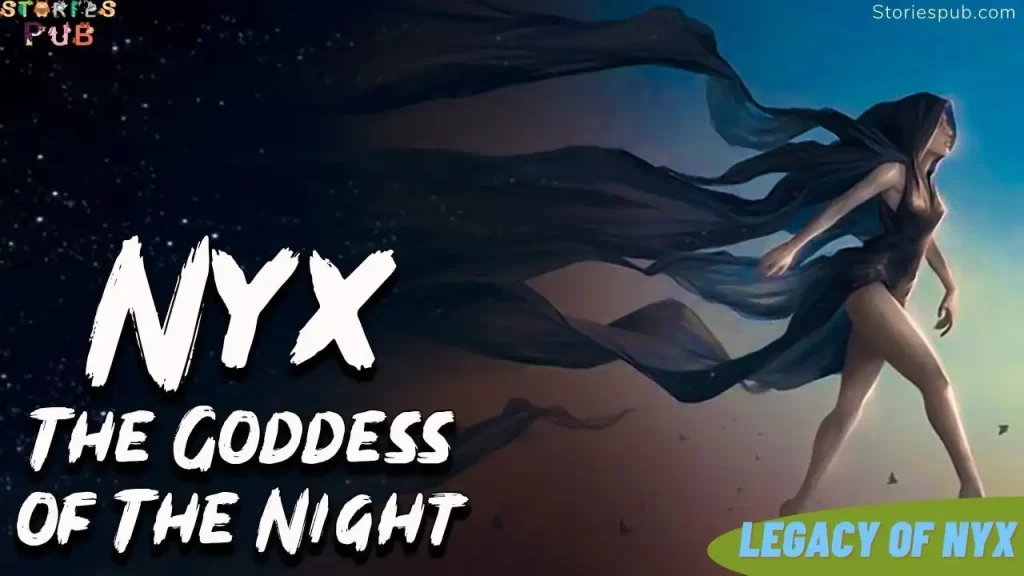The Legacy of Nyx, the Ancient Greek Goddess of the Night

Nyx is a Greek goddess of the night and is considered one of the primordial deities in ancient Greek mythology. She came from Chaos, the first of the elements, according to Greek creation stories, and was thought to be the mother of many other gods and creatures in Greek mythology.
Nyx was a mysterious and powerful deity, associated with darkness and all that was unknown. She was said to bring dreams to humans at night and was also associated with death, sleep, and the underworld. Nyx was so powerful that even the mighty Zeus was afraid of her, and he was said to have respected her greatly.
You would also like to Read List of Greek Goddesses
One story about Nyx is that she had many children, including Morpheus, the god of dreams, and Hypnos, the god of sleep. Together, these gods were said to control the realm of the night and have the power to manipulate the dreams of mortals. Nyx was also said to have given birth to the Fates, the three goddesses who controlled the destiny of every human and deity.
In another story, Nyx was said to have been responsible for the deaths of the giant beasts known as the Titans. According to legend, Nyx slipped into their camp one night and killed them all with her deadly weapons.
You would also like to Read Tales of Ancient Greek Heroes
Despite her association with death and the underworld, Nyx was not seen as evil or malevolent in ancient Greek mythology. Instead, she was respected as a strong and necessary force that kept the balance between light and dark and reminded people that death was inevitable.
In conclusion, Nyx was an important and powerful goddess in ancient Greek mythology, representing the forces of the night and the underworld. Her presence was both feared and respected, and her stories serve as a reminder of the power and mystery of the night.
Nyx goddess family background
In Greek mythology, Nyx is said to have had several children, including the following:
– Hypnos (Sleep): The sleep god, who is said to be able to put mortals and gods to sleep.
– Thanatos (Death): The god of death, often portrayed as a hooded figure wielding a pair of scythes.
Moros (Doom): The personification of doom or fate, who was said to foretell all mortals’ fate.
– Geras: The god of old age, believed to bring physical decay and, eventually, death.
As for her husband, Nyx was said to have been consort to Erebus, the god of darkness. Erebus was also considered one of the primordial gods and was said to have been born from the chaos that existed before the creation of the universe. Together, Nyx and Erebus were thought to be the parents of several other mythological figures, such as Charon, the ferryman of the dead, and Momus, the god of mockery.
Nyx’s powers
In Greek mythology, Nyx was considered to have several powerful abilities, including:
Control over Night: As the goddess of the night, Nyx was said to have complete control over all aspects of the night, including sleep, death, and the underworld.
Influence over Fate: People thought that Nyx could decide what would happen to mortals, and she was often linked to the threads of fate that controlled the lives of all living things.
You would also like to Read List of Greek God
Power over Dreams: Nyx was said to have the ability to send both good and bad dreams to mortals and was associated with the dream world and the realm of the subconscious mind.
Control over Darkness: Since Nyx was married to Erebus, the god of darkness, she was also thought to have control over the darkness that filled the universe.
Influence over the Underworld: Nyx was sometimes considered the mother of Helios, the goddess of the Underworld, and was thus associated with the afterlife and the realm of the dead.
You would also like to Read Zagreus Story
In addition to these powers, Nyx was also said to possess great beauty and allure and was often depicted as a mysterious and elusive figure. Despite her beauty, however, Nyx was also considered a formidable deity and was feared and revered by both gods and mortals alike.
Nyx’s limitations
In Greek mythology, the limitations of the goddess Nyx are not explicitly stated. However, as a deity, she was considered to be powerful and to possess great influence, but she was not considered to be all-powerful or omnipotent. The gods and goddesses in Greek mythology were often portrayed as having their own unique abilities but also as being subject to certain limitations and restrictions.
It was believed that the gods and goddesses were subject to the laws of the universe and to the will of the supreme deity, Zeus. People thought that some gods and goddesses were more powerful than others, but that they all had the same limits and restrictions.
You would also like to Read Mighty Hecatoncheires Story
It is also worth noting that the ancient Greeks believed that the gods and goddesses could be affected by the actions of mortals and that the gods could be influenced by the offerings and prayers of mortals. In this sense, the limitations of the gods were thought to be determined in part by the behaviour and beliefs of mortals.
What is Nyx the goddess of?
In Greek mythology, Nyx is the goddess of the night. She is one of the primordial deities, having been born from Chaos, the void that existed before the creation of the universe. Nyx is associated with darkness, mystery, and all that is unknown, and was seen as a powerful and necessary force in the ancient Greek worldview. She was revered for her role in bringing dreams to humans at night and was associated with death, sleep, and the underworld. Nyx was seen as a force that balanced the light of day and the darkness of night, and her stories serve as a reminder of the power and mystery of the night.
Why is Zeus scared of Nyx?
In Greek mythology, Zeus, the king of the gods, was said to respect and fear Nyx, the goddess of the night. This was because Nyx was seen as a mysterious and powerful force that was beyond the control of even the mighty Zeus.
You would also like to Read Aeneas: The Hero of Troy
Nyx was one of the primordial deities in Greek mythology, having been born from Chaos, the void that existed before the creation of the universe. She was associated with darkness, mystery, and all that is unknown and was revered for her role in bringing dreams to humans at night and her association with death, sleep, and the underworld.
Zeus was aware of Nyx’s power and was said to respect her greatly, even though he was the king of the gods. In some stories, it was said that Zeus was afraid to anger Nyx, as her powers were so great that she could cause trouble for the gods and mortals alike.
Overall, the fact that Zeus was afraid of Nyx shows how important and powerful she was in Greek mythology. It also shows that even the strongest gods can be afraid of the unknown and should respect its power.
Was Nyx good or evil?
In Greek mythology, Nyx, the goddess of the night, was not considered to be inherently good or evil. Instead, she was seen as a powerful and necessary force that balanced the light of day with the darkness of night.
Nyx was associated with death, sleep, and the underworld and was revered for her role in bringing dreams to humans at night. However, her powers were not seen as malevolent or evil, but rather as a natural part of the cycle of life and death.
You would also like to Read Creatures of Ancient Greece
In some stories, Nyx was depicted as having a negative influence on the world, causing trouble for the gods and mortals alike. For example, she was said to have been responsible for the deaths of the giant beasts known as the Titans. However, these stories were meant to highlight the power and mystery of the night, not to cast Nyx as an evil deity.
Overall, Nyx was seen as a powerful and mysterious deity who was neither good nor evil but rather a necessary force in the world of ancient Greek mythology.
What was Nyx’s personality like, and who was she in love with?
In Greek mythology, Nyx, the goddess of the night, was not typically depicted as being in love with any particular deity. Instead, she was seen as a powerful and mysterious force that was beyond the realm of personal relationships.
As for her personality, Nyx was often depicted as dark and mysterious, shrouded in shadows, and associated with the unknown. She was revered for her role in bringing dreams to humans at night and was associated with death, sleep, and the underworld. Nyx was seen as a force that balanced the light of day with the darkness of night and was not considered to be inherently good or evil.
In some stories, Nyx was depicted as having a negative influence on the world, causing trouble for the gods and mortals alike. For example, she was said to have been responsible for the deaths of the giant beasts known as the Titans. However, these stories were meant to highlight the power and mystery of the night, not to cast Nyx as an evil deity.
Overall, Nyx was seen as a powerful and mysterious deity who was not characterised by personal relationships or a specific personality but rather as a necessary force in the world of ancient Greek mythology.
Nyx goddess symbol, weapon, and zodiac sign?
In Greek mythology, symbols, weapons, and zodiac signs were linked to Nyx, the goddess of the night:
Symbol: Nyx was often depicted holding a pair of wings, which symbolised her ability to move quickly and silently through the night. She was also sometimes shown carrying a torch or wearing a crown of night-blooming flowers.
Weapon: Nyx was not typically associated with any particular weapon.
Zodiac Sign: Nyx was not associated with a specific zodiac sign in ancient Greek mythology. The zodiac signs as we know them today were not developed until much later, and the Greeks associated the stars and constellations with different gods, heroes, and creatures.
It’s worth noting that while Nyx was an important deity in Greek mythology, the specific symbols, weapons, and associations with the zodiac varied among different cultures and over time. The ancient Greeks had a rich and complex pantheon of gods and goddesses, each with their own unique stories, attributes, and associations.
What is the lesson and conclusion from the Nyx Goddess story?
The story of Nyx, the goddess of the night, has several lessons and conclusions that can be drawn from it.
Power of the unknown: Nyx represents the power and mystery of the night, reminding us of the unknown forces that exist in the world. Even though the unknown can be scary, her story shows how important it is to respect and acknowledge its power.
Balance of light and dark: Nyx balances the light of day with the darkness of night, reminding us of the importance of finding balance in our lives. The night is a necessary part of the cycle of life, just as the day is, and the story of Nyx serves as a reminder of the beauty and power of the darkness.
Dreams and sleep: Nyx is associated with bringing dreams to humans at night and with death, sleep, and the underworld. Her story highlights the importance of sleep and the role that dreams play in our lives, reminding us to take care of our bodies and minds so that we can experience the benefits of restful sleep.
The cycle of life and death: Nyx is associated with death and the underworld, reminding us of the cycle of life and death that is an inherent part of existence. Her story shows how important it is to accept that death is inevitable and learn to live our lives to the fullest, even though we know that everything must end at some point.
Overall, the story of Nyx serves as a reminder of the power and mystery of the unknown, the importance of balance, the role of sleep and dreams, and the cycle of life and death. It tells us to respect and acknowledge the forces we don’t understand, and it tells us to find peace and balance in our lives.
Hey kids, how much did you like The Legacy of Nyx, the Ancient Greek Goddess of the Night? Please share your view in the comment box. Also, please share this story with your friends on social media so they can also enjoy it, and for more such stories, please bookmark storiespub.com.
Check out other stories that we have:





